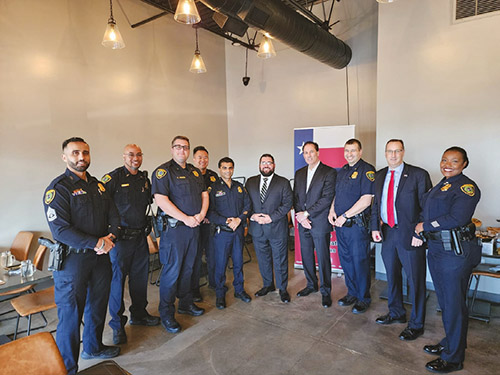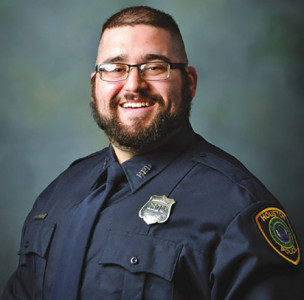
Houston Police Officer Jacob Novikov wasn’t sure how he would be received when he knocked on Alan Rosen’s office door. Rosen is the constable of Harris County Precinct One, and Novikov had only spoken with him once before over the phone. As Houston’s first-ever Orthodox cop, Novikov was searching out Jewish first responders in the area to find ways to advocate for the local Jewish community. Rosen, who was born and raised in the Houston area and has deep ties to the community, was a natural point of contact.
Rosen’s door swung open, and he wrapped Novikov in a bear hug. For the next hour, the two men discussed setting up a Texas chapter of the Shomrim Society, a fraternal organization that fosters cooperation between Jewish communities and law enforcement. Novikov left the meeting heartened. He was a newcomer to Texas, and the conversation with Rosen bolstered his perception of Houston as a friendly and welcoming environment.
Novikov joined the Houston Police Department on the heels of an eight-year stint with the New York Police Department. He’d signed on to be a cop immediately upon his graduation from Yeshiva University in 2012. But when Novikov matriculated at YU in 2009, law enforcement wasn’t part of the plan. He started off as a business major and switched to pre-law when a law student cousin sparked his interest in a legal career. But the seeds of the police life had been planted some time earlier.

As a high school student in Boston’s Brighton neighborhood, Novikov was looking to beef up his extracurriculars for his college applications. He signed up for the Franklin, Massachusetts chapter of the Explorer Program, which exposes young people to careers in law enforcement. He got his first taste of police work through the scenarios and competitions organized by the Explorers. As he prepared for his gap year in Israel, his Explorer mentor suggested he consider a law enforcement career. Novikov demurred. “Nice Jewish boys don’t become cops,” he said.
Novikov nevertheless recalled his Explorer experience while applying for college internships. He figured that, as a future lawyer, exposure to the City’s criminal justice system could be valuable. He applied and was accepted to the NYPD cadet program, a paid internship within the NYPD. Though not yet a sworn officer, Novikov was now officially a member of the police force, performing administrative work for detectives. In his powder blue cadet uniform, he became a common sight on the YU campus. The idea of a law enforcement career grew stronger.
At the time, Novikov shared an apartment with two Israeli students attending YU on a wrestling scholarship. They needed a heavyweight, they said. Could Novikov try out for the team?
He sure could. Novikov wrestled for YU for two seasons as one of the smallest guys in the heavyweight division. “I won one match in my life,” he remembered. “But as a cop, those skills come in handy.”
Novikov had reached a decision. He loved his time as an Explorer and as an NYPD cadet. The NYPD had made him an offer to join full-time as a police officer upon graduation. His Explorer mentor was right—a law enforcement career was indeed Novikov’s path.
His mother, a refugee from the Soviet Union, was understandably nervous about her son’s career choice. She felt that the best way to avoid persecution was to find a respectable job in business or law and blend in. But Novikov had no intention of blending in. He would serve New York as a proud Jew.
NYPD policy is that officers must be clean-shaven and bare-headed other than standard-issue headgear. The NYPD Shomrim Society had successfully advocated for exceptions for Jewish officers, who were allowed to don kippot, wear trim beards, and take off for Shabbat. Even so, Novikov was nervous as he was fingerprinted at NYPD headquarters as part of the new hire screening process. A big, tough-looking, Irish cop looked from Novikov’s kippah to his beard and back again through narrowed eyes as he rolled Novikov’s fingers with a powerful grip. For a fleeting second, Novikov wondered if he’d made a mistake. Finally, the cop spoke.
“Let me ask—do you know the Rebbe?”
Novikov was confused. “Who?”
“You know, the Schneerson guy from Crown Heights,” the officer replied. “I was the bodyguard assigned to him from the NYPD. I still have one of his dollars in my locker.”
Novikov, Chabad by inclination, took this as a good sign.
Not everyone was as accepting as the fingerprint officer. At the NYPD police academy, one instructor would regularly whip out a ruler and publicly measure Novikov’s beard to ensure compliance with religious beard codes. Still, Novikov excelled at the academy and graduated in the top 10% of his class. Jacob took an apartment in Washington Heights, where he was a congregant at Mount Sinai Jewish Center on Broadway and 187th Street.
Police work was gratifying, but busy. During his first winter on the job, Novikov was coming off a shift late one night and remembered with a jolt that it was the first night of Chanukah. He’d been so engrossed with work that he’d neglected to purchase candles for his menorah. All the Jewish stores in Manhattan were closed. Novikov was at a loss when he happened upon two young Chabad men handing out boxed menorahs and sufganiyot. They spotted Novikov.
“Are you Jewish?” one asked.
“Am I?!” was the enthusiastic response. Novikov whipped off his police cap to show the young men his kippah and gratefully accepted a boxed menorah, candles included.
In the wake of the killing of George Floyd, Novikov sensed morale at the NYPD slipping, as well as community support. Despite the fact that he was on track to become a detective, he and his wife, Rachel, decided to move with their son to Houston in Rachel’s home state of Texas. Joining the Houston Police Department meant taking a pay cut and attending police academy for the second time. HPD’s first Orthodox recruit made quite an impression. Novikov finished second in his class and was elected class president. In his graduation speech, he quoted Martin Luther King Jr. and the Lubavitcher Rebbe and stressed the importance of community in a multi-ethnic city like Houston.
In 2022, Novikov went to work setting up the local chapter of the Shomrim Society. Uniquely, Texas’ Shomrim Society is open to all Jewish first responders, not just policemen. The chapter is approximately 30 members strong and growing. Novikov is hard at work securing the accommodations for Houston’s Jewish cops that he enjoyed in New York. He also arranged for the first meeting between law enforcement partners and Jewish leaders, set to occur this spring.
“We are small in number,” Novikov said, “but we are doing big things.”
By Zvi Joshua Wiesenfeld









